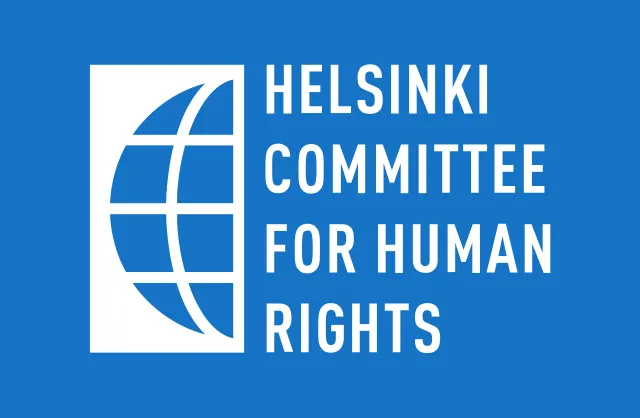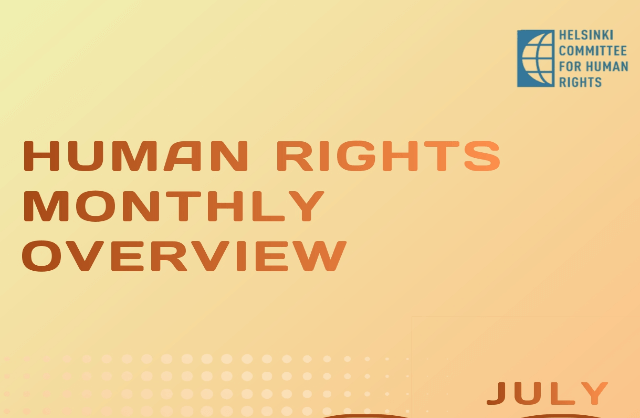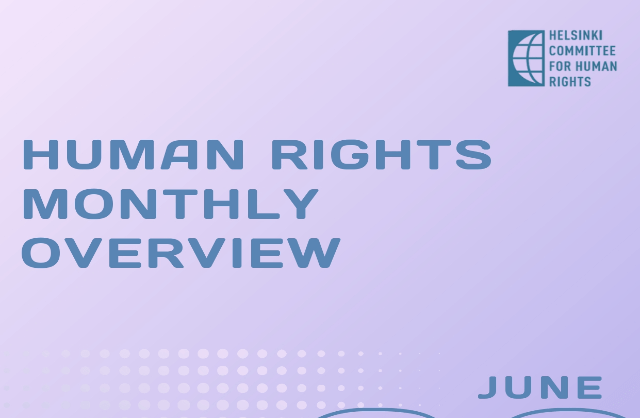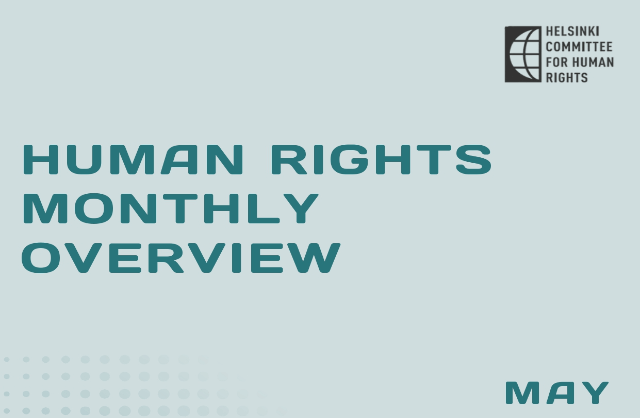Monthly report – Junе 2016
July 29, 2016

The Monthly report on the human rights situation in the Republic of Macedonia for May 2016 includes the following topics: International Day in Support of Victims of Torture; The Helsinki Committee for Human Rights Visits the Special Institution − Demir Kapija; CPD Confirms an Act of Discrimination against a Transgender Person; Hate Speech Aimed at LGBTI Community; Macedonia Shows Lack of Progress in the Realization of Economic, Social and Cultural Rights; Macedonia Fails to Provide Social Security for its People.
The monthly report can be downloaded at the following link.
INTERNATIONAL DAY IN SUPPORT OF VICTIMS OF TORTURE
On June 26th, the International Day in Support of Victims of Torture and other Cruel, Inhuman or Degrading Treatment or Punishment was marked. In his address to the nations, the General Secretary of the United Nations, Ban Ki-moon, urged: “The law is crystal clear: torture can never be used at any time or under any circumstances, including during conflict or when national security is under threat. On this International Day in Support of Victims of Torture, we express our solidarity with and support for the hundreds of thousands of victims of torture and their family members throughout the world”.
During 2015, the European Court of Human Rights delivered a record of 5 judgments against the Republic of Macedonia concerning Article 3 of the European Convention on Human Rights – Prohibition of Torture. All judgments are concerned with torture inflicted by state officials, but despite the fact that these cases were reported to prosecution offices, either no investigation was initiated or the investigation proved completely ineffective. Within the past three years, the Helsinki Committee has registered a dozen of cases for which prosecution offices failed to conduct an effective investigation or the state refused to cover the costs. Some of these cases are, for example, the brutally attacked citizen by the police on a street in Ohrid, the convict who lost a kidney and his spleen as a consequence of an attack by a prison police officer, the many police force attacks on Roma community in Topaana, the beating of an innocent young man in the police station in Demir Hisar, the beating of Roma minors by the Police Unit “Alfa”, the tying of minor Leon who was mistakenly placed in an institution for people with physical disability, and the use of contaminated water in the Prison “Kumanovo”.
During March 2016, the Helsinki Committee sent 49 requests to basic public prosecution offices and courts for information on registered cases concerning criminal acts on Torture and other Cruel, Inhuman or Degrading Treatment or Punishment (average prison sentence for 3 to 20 years) and Workplace Harassment (average prison sentence from 1 to 5 years) for the period from 2009 to 2015. Information was received for 21 (out of 26) cases from courts and 20 (out of 23) from public prosecution offices. According to the received responses from the courts, during a period of six years, they acted upon 22 cases related to torture and 56 cases related to harassment. Regarding the crimes of torture, there wasn’t even a single conviction with a prison sentence. There were only eight convictions with a conditional sentence as an alternative measure. As for the crime of workplace harassment, there was only one conviction with a prison sentence (of six months) and 16 convictions with a conditional sentence. The basic public prosecution offices acted upon 32 torture crimes. Only 7 of those were investigated and charges were subsequently brought. The public prosecution offices acted upon 138 cases of workplace harassment, 30 of which were investigated, and charges were brought for 22 of those cases.
RECOMMENDATION:
The Helsinki Committee joins the marking of this international day and urges the authorities to finally acknowledge the existence of torture as well as to develop politics for protection against these barbarian acts. Authorities must incorporate a politics of zero tolerance towards acts of torture inflicted by officials. It is high time we faced the phenomenon of impunity and the developed solidarity among public prosecution offices, the courts and the police. The main focus must be on torture victims for whom the state continuously fails to provide appropriate legal, medical, psychological and social support.
THE HELSINKI COMMITTEE FOR HUMAN RIGHTS VISITS THE SPECIAL INSTITUTION − DEMIR KAPIJA
The Helsinki Committee for Human Rights of the Republic of Macedonia, accordingly to the strategic and long-established practice of visiting the detention facilities in the country, visited the PI Special Institution – Demir Kapija. The visitation took place on 5 February 2016 after a previously obtained approval by the Ministry of Labor and Social Politics no. 10-241/2 from 15.01.2016. The purpose of the visit was establishing the factual situation of the existing conditions and the practicing of basic human rights by persons with intellectual disabilities placed in this institution, who due to their vulnerable state represent a sensitive category of citizens and are entitled to special rights depending on their special needs.
The Helsinki Committee representatives noticed a number of shortcomings in terms of the living conditions of the patients, the healthcare, the treatment and care for patients, and the program contents and activities. Especially worrying was the data from the book of deaths. According to the book, from 1993 to 5 February 2016, a total number of 375 persons died at the Special Institution. Most of the deaths were caused by lung disease in the patients. The majority of the patients who died from lung diseases were immobile patients with profound intellectual disabilities who were placed in Block B2. Block B2 does not have a door, and patients residing in that Block are constantly exposed to draught, so the fact that most of those patients suffer from lung diseases is not surprising. Especially alarming is the death of a patient who was under the custody of the Center for Social Work. The patient complained of a stomach ache which was followed by fecal vomiting. The staff decided to send the patient to General Hospital Veles for a scan, but since the hospital failed to discover what caused his condition, he was sent back to Demir Kapija. Due to a continuous fecal vomiting, the patient was sent for treatment to Skopje, but he passed away during transportation. The autopsy showed that the patient had a pacifier obstructing his colon, which points to negligence on part of the employees in the Special Institution, but also to the unprofessional treatment in the hospital in Veles. We were informed that the autopsy report was submitted to the Director of the Special Institution in Demir Kapija and the Center for Social Work as the patient’s custodian. For this case, the Helsinki Committee will file criminal charges to the authorized Public Prosecutor’s Office.
The full report can be found on the Helsinki Committee webpage on the following link:
RECOMMENDATION:
With the aim of urgently solving the problems established during the visitation of the Special Institution in Demir Kapija, the Helsinki Committee recommends:
1. A full implementation of the National Strategy for Deinstitutionalization 2008-2018 at the Special Institution in Demir Kapija;
2. Increasing the number of medical specialists as well as employing permanent doctors of internal medicine (general physician, gynecologist, and dentist) who would follow the patients’ health condition on a daily basis so that the patients could exercise all health insurance rights.
3. Increasing the number of medical nurses and caregivers who would take care of fewer patients;
4. Increasing the number of cleaning staff, especially in the wards where the patients are incapable of maintaining hygiene.
5. Improvement of the infrastructure of the Special Institution, especially of the interior with the installation of new doors and windows, replacing the beds and bedding, and setting up wardrobe closets in the patients’ rooms.
6. Conducting a full investigation into the death of the patient whose autopsy revealed a pacifier in the colon and initiating a criminal proceeding against possible perpetrators.
7. Taking active measures for decreasing the high mortality rate of patients in the Special Institution Demir Kapija.
CPD CONFIRMS AN ACT OF DISCRIMINATION AGAINST A TRANSGENDER PERSON
On 10.06.2016, the Commission for Protection against Discrimination (CPD) issued an opinion which confirms the occurrence of discrimination based on gender identity. It refers to a case in which a transgender person was banned from entering a facility providing public services – a public swimming pool, i.e. his access to public services was restricted due to his gender identity. The Helsinki Committee for Human Rights as the victim’s representative filed a motion to the Commission for Protection against Discrimination requesting for confirmation of discrimination based on gender identity.
Even though the opinion of the Commission defined this as a gender-based discrimination, the explanation clearly states that the victim’s gender identity was the actual reason for the restriction of entry. The Commission also pointed out to the discriminator to compensate for damages to the victim within 30 days.
After receiving the Opinion and advising with the Helsinki Committee, the victim as the injured party and the discriminator as the wrongdoer decided to settle the dispute extrajudicially. For that purpose, they concluded an agreement for damage compensation in which the discriminator admitted his guilt for the event and then both sides agreed to the amount of compensation as well as the conditions for its payment. This agreement was signed in an extrajudicial settlement for damage compensation because of discrimination based on gender identity.
RECOMMENDATION:
This represents a huge progress in the fight against discrimination and should be a motive and an encouragement for those who have been or will be victims of discrimination to report violations of their rights. Also, we hail the issued Opinion by the Commission and we urge its members to continue working in this way in the future as to efficiently protecting all citizens within the scope of its responsibilities.
HATE SPEECH AIMED AT LGBTI COMMUNITY
On 12.06.2016 in Orlando, Florida, a horrifying attack on the gay club Pulse took place, in which 50 people were murdered and 53 were injured. The victims of the attack were members and supporters of the LGBTI community. The incident caused reactions worldwide and it was condemned and considered as a consequence of a long-lasting homophobia and hatred towards the LGBTI community.
The Helsinki Committee, upon monitoring hate speech among the public, noticed a significant degree of hate speech based on sexual orientation and gender identity among the country’s internet community as a reaction to the reports on the homophobic attack. The detected hate speech on web pages and social networks involved terrifying justifications of the attack on the LGBTI community, as well as words of encouragement for further attacks on LGBTI people in general. The Helsinki Committee most severely condemns the cases of spreading hate speech based on sexual orientation and gender identity and reminds that spreading hate speech is a criminal act. Its particular danger is most obvious in the causing and encouraging the occurrence of hate crimes.
RECOMMENDATION:
National institutions should take measures for raising awareness among citizens for LGBTI community’s rights, with a special emphasis on the prevention of hate speech based on race, gender, sexual orientation and gender identity. We appeal to competent institutions to take appropriate measures in a timely manner for prosecution and punishment of perpetrators who spread, incite, and promote hate speech among the public.
MACEDONIA SHOWS LACK OF PROGRESS IN THE REALIZATION OF ECONOMIC, SOCIAL AND CULTURAL RIGHTS
The UN Committee on Economic, Social and Cultural Rights recommended that the Republic of Macedonia should take measures in prohibiting and preventing discrimination based on sexual orientation and gender identity, eliminate stereotypes and stigmatization against LGBTI persons and take effective investigation for solving cases of violence against LGBTI persons, revise the Law on Prevention and Protection against Discrimination, improve the living conditions in transit camps for refugees, stop the illegal retroactive application of the Law on Social Protection and the unlawful abolition of social welfare rights, ensure an effective and timely investigation for all reported cases of domestic violence and take all necessary measures for preventing segregation of Roma children in education.
On the 58th session of the UN Committee on Economic, Social and Cultural Rights, the representative of Helsinki Committee for Human Rights of the Republic of Macedonia pointed out the problems regarding the protection of rights for immigrants and asylum seekers, the discrimination of the LGBTI persons in matters of social services, the unlawful abolition of the right to financial social assistance, the non-application of the Law to Prevention and Protection of Domestic Violence on part of the relevant institutions, the inefficiency of the healthcare system and the limited access to health services, the segregation of Roma Children in education and the access to education in juvenile prisons.
In its concluding recommendations, the UN Committee on Economic, Social and Cultural Rights, among other things, requires the state to review and amend the Law on Prevention and Protection against Discrimination by including sexual orientation and gender identity as separate grounds for discrimination. The Committee urges the state to take all necessary measures for prohibition and prevention of discrimination based on sexual orientation and gender identity, to make sure that same-sex couples can enjoy the same advantages as married couples, to eliminate negative stereotypes for stigmatization of LGBTI people by revising student’s books and organizing campaigns for raising awareness among the public, health, and social workers, by proper enforcement of legislation and by conducting efficient investigations and prosecution for cases of violence against LGBTI persons.
In terms of the protection of refugees and people seeking asylum, the Committee urges the state to improve the living conditions in the two transit centers for refugees by allowing people in those centers access to healthcare, education and other necessary services, as well as to meet the needs of women, children, people with disabilities and sick persons. The Committee also urges the state to take all necessary measures to allow access to all active measures for employment of persons under subsidiary protection. The Committee also recommends that the State withdraws the amendment to Article 8 of the Law on Asylum and Temporary Protection, which will reduce the waiting period for family reunification of persons under subsidiary protection.
The Committee is concerned about the retroactive application of the Regulation on the method of determining the income, property and property rights of households, the determination of the right holder and the necessary documentation for exercising the right to social welfare, which leaves a large number of disadvantaged individuals with an illegally terminated financial social assistance and, in addition, these persons are obliged to return money and they have a restricted use of the right to social welfare in the future. The Committee urges the state to cease the retroactive application of the Regulation and to allow access to the social welfare of all persons whose right has been terminated by the illegal retroactive application of the Regulation. At the same time, the Committee recommends the state to increase the amount of social benefits up to a level which would allow a normal living standard for users of these benefits.
The Committee advises the state to take all appropriate measures for protecting victims of domestic and gender-based violence, to conduct timely and effective investigations into all cases reported on domestic and gender-based violence and to ensure that all perpetrators of domestic and gender-based violence will be brought to justice. Also, the Committee recommends the state to ratify the Istanbul Convention in order to increase the number of shelters and to provide free legal, medical, physical and psychological assistance to victims.
Finally, the Committee urges the State to intensify its efforts and to take all measures for preventing the excessive number of Roma children in special schools and special classes in regular schools by revising the criteria for categorization andadoption of inclusive and integrating educational programs.
RECOMMENDATION:
The Helsinki Committee for Human Rights of the Republic of Macedonia hails the concluding observations of the UN Committee on Economic, Social and Cultural Rights and urges the state to immediately begin taking measures and actions to implement the concluding recommendations, to allow full implementation of the International Covenant on Economic, Social and Cultural Rights.
THE РEPUBLIC OF MACEDONIA FAILS TO PROVIDE SOCIAL SECURITY FOR ITS PEOPLE
According to the Constitution, the Republic of Macedonia is declared as a welfare state which provides social protection and social safety for its citizens by respecting the principle of social equality. Macedonian citizens exercise social protection in the procedure established by the Law on Social Protection through various forms of protection including the right to financial social assistance. The conditions for exercising this right are as follows: the person requesting should be a person capable of working and maintaining a household, should be materially deprived, and a person who, under other regulations, cannot provide a basic income.
However, the case of the person J. I., who addressed the Helsinki Committee for Human Rights with a request for legal assistance, confirms the conclusion that social security and social justice are merely declaratory principles which do not have a real implication on the life and well-being of disadvantaged individuals.
Namely, the Public Inter-Municipal Center for Social Work Kumanovo, upon acting ex officio restricted the right to financial social assistance of the person J. I. because he received an amount of 1,112.00 MKD for making picture frames through Kumanovo Municipality in 2013. This decision had been primarily annulled by the former Minister of Labour and Social Policy, Frosina Remenski, after which the Public Inter-Municipal Center for Social Work Kumanovo made an identical decision which was subsequently confirmed by the current Minister of Labour and Social Policy.
We would like to emphasize that the above-mentioned amount cannot be considered as earned income because it does not exceed the amount the person receives as financial social assistance, i.e. 1,200.00 MKD, as indicated in the Law on Social Protection. In addition, this is a one-time received amount estimated annually. If that amount is divided into 12 months, it appears that the person received 92 MKD per months, which in no way is considered as an income which changes his material and financial standing.
That the received amount should not be considered as income which needs to be reported as a change of financial position is also evident from the amended Article 2, paragraph 2 from the Rules amending the Rules on the manner of determining the state of income, property and property rights of the household, the determining of the right holder and the necessary documentation for practicing and use of the financial social assistance right enforced on September 4th, 2015, where it is stated as follows: “Notwithstanding paragraph 1, item 4 of this Article, the registered or the net income from the Public Revenue Office of all household members who fall into the category of other revenues in accordance with the regulations concerning taxes, amounting to 30,000 MKD annually, are not considered as income in terms of exercising and using the right to financial social assistance.” This Article should be applied in the specified case, especially because of the given option in the Constitution of the Republic of Macedonia in Article 52, paragraph 4, which states that: “Laws and other regulations may not have a retroactive effect, except in cases when this is more favorable for the citizens.”
By expressing concern for the manner, the conditions and the procedure through which citizens belonging to vulnerable society groups exercise their social welfare rights, the Helsinki Committee for Human Rights believes that the amendments to the Rules on the manner of exercising and using the right to financial social assistance should be consistently implemented in order to achieve the purpose of social welfare – overcoming the basic social challenges to which citizens are exposed throughout life, reducing poverty and social exclusion as well as strengthening the citizens’ capacity for self-protection.


